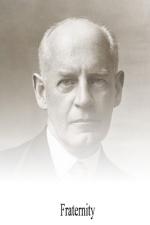’I know the girl can’t have bought those things out of her proper earnings. I believe she’s a really bad lot. I don’t like to think it, but it must be so. Hilary can’t have been so stupid after what I said to him. If she really is bad, it simplifies things very much; but Hilary is just the sort of man who will never believe it. Oh dear!’
It was, to be quite fair, immensely difficult for Stephen and his wife—or any of their class and circle—in spite of genuinely good intentions, to really feel the existence of their “shadows,” except in so far as they saw them on the pavements. They knew that these people lived, because they saw them, but they did not feel it—with such extraordinary care had the web of social life been spun. They were, and were bound to be, as utterly divorced from understanding of, or faith in, all that shadowy life, as those “shadows” in their by-streets were from knowledge or belief that gentlefolk really existed except in so far as they had money from them.
Stephen and Cecilia, and their thousands, knew these “shadows” as “the people,” knew them as slums, as districts, as sweated industries, of different sorts of workers, knew them in the capacity of persons performing odd jobs for them; but as human beings possessing the same faculties and passions with themselves, they did not, could not, know them. The reason, the long reason, extending back through generations, was so plain, so very simple, that it was never mentioned—in their heart of hearts, where there was no room for cant, they knew it to be just a little matter of the senses. They knew that, whatever they might say, whatever money they might give, or time devote, their hearts could never open, unless—unless they closed their ears, and eyes, and noses. This little fact, more potent than all the teaching of philosophers, than every Act of Parliament, and all the sermons ever preached, reigned paramount, supreme. It divided class from class, man from his shadow—as the Great Underlying Law had set dark apart from light.
On this little fact, too gross to mention, they and their kind had in secret built and built, till it was not too much to say that laws, worship, trade, and every art were based on it, if not in theory, then in fact. For it must not be thought that those eyes were dull or that nose plain—no, no, those eyes could put two and two together; that nose, of myriad fancy, could imagine countless things unsmelled which must lie behind a state of life not quite its own. It could create, as from the scent of an old slipper dogs create their masters.
So Stephen and Cecilia sat, and their butler brought in the bird. It was a nice one, nourished down in Surrey, and as he cut it into portions the butler’s soul turned sick within him—not because he wanted some himself, or was a vegetarian, or for any sort of principle, but because he was by natural gifts an engineer, and deadly tired of cutting up and handing birds to other people and watching while they ate them. Without a glimmer of expression on his face he put the portions down before the persons who, having paid him to do so, could not tell his thoughts.




